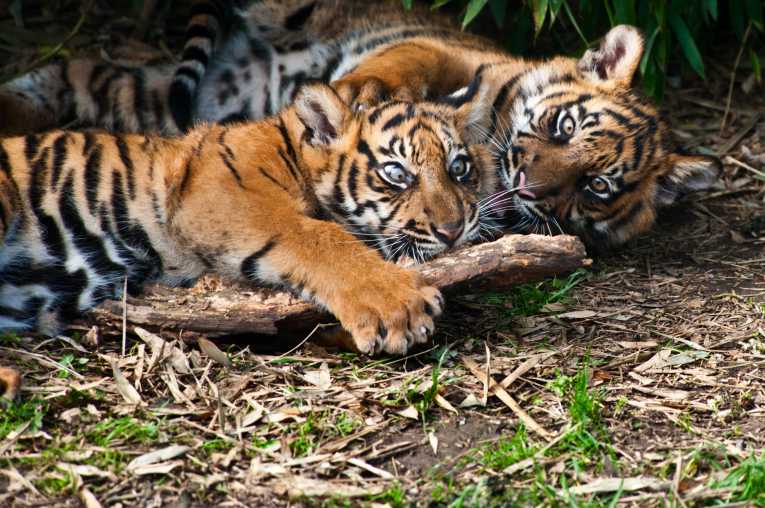Rare footage of Sumatran tiger cubs playing in an Indonesian rainforest was released yesterday by WWF. Camera traps captured images and footage of 12 Sumatran tigers, including two females with cubs, in the Bukit Tigapuluh forests. This is a great boost for tiger conservationists as there are thought to be only 400 of the Critically Endangered Sumatran tigers remaining in the wild.
The Bukit Tigapuluh forests have a huge conservation value and are vital habitats for many Indonesian species. They are home to over 30 tigers, 150 Sumatran elephants and 130 orangutans, not to mention countless other endemic species. Despite the rare wildlife found in the forests Bukit Tigapuluh, they are under threat of deforestation to grow new tree species for the pulp and paper industry.
Both the Barito Pacific Group and Asia Pulp & Paper/Sinar Mas Group have pending permits to clear the forest habitat. Trees for the pulp and paper industry don't support the wide variety of wildlife currently found in Bukit Tigapuluh, and they don't provide suitable habitat for tigers. Since 2004, 205,460 hectares of forest in Bukit Tigapuluh have been lost to deforestation.
Sumatran tiger cubs playing.
Dr Barney Long, Manager of the WWF-US Tiger Program, said ''It's really great to see that tigers are continuing to breed in the Bukit Tigapuluh landscape. This is a critical landscape for tiger conservation and one that is rapidly being cleared by companies to produce pulp and paper. We need to protect this forest landscape and the corridor that connects it to other tiger populations in order to save these magnificent animals, as well as the many services that the forests provide for the indigenous communities that call it home.''
In November 2010, the Indonesian government pledged to protect Bukit Tigapuluk as part of the tiger summit that took place in Russia. It is now designated a 'Global Priority Tiger Conservation Landscape.' Many human rights and conservation groups, including WWF, are calling on the Indonesian government to honour that pledge and ensure the forest remains free from logging.
''We urge companies and consumers in the U.S. to ensure that any paper products that they buy do not contribute to the destruction of Sumatran tiger habitat,'' said Linda Kramme, Manager of WWF's Global Forest and Trade Network-North America. To ensure that you don't contribute to the continued deforestation in Indonesia, make sure you only buy Forest Stewardship Council (FSC) certified paper and try to avoid products containing palm oil.










